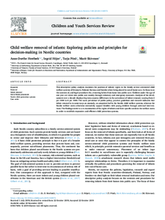Abstract
This descriptive policy analysis examines the position of infants’ rights in the family service orientated child welfare systems of Denmark, Finland, Norway and Sweden when being placed in out-of-home care. Its focus is on the contexts of, and legal procedures for, removing babies from home into public care. Children under the age of one year are taken into public care mainly through voluntary and emergency measures. Analysis of the development over a decade displays big intra-country differences in the prevalence of infant removal, varying from 2 per 1000 to 8 per 1000. The scant prevalence of public policy, practice guidelines and research indicates that infant removal is in some ways an anomaly, an unspoken leaf in the Nordic child welfare systems, whereas the Nordic welfare states otherwise extensively support families with young children through universal interventions. The findings invite to a re-examination of the rights of infants and their specific needs in the welfare states in order to establish responsive and efficient child protection systems.
View article here.

